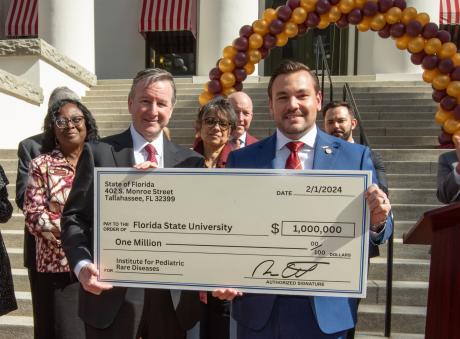Groundbreaking Institute for Pediatric Rare Diseases launched at FSU College of Medicine


Florida State University Day at the state Capitol included a celebration of the launch of the newest center at the College of Medicine, the Institute for Pediatric Rare Diseases, which is dedicated to advancing research and developing treatments for unusual childhood diseases.
Filling a critical gap in the health-care industry, the institute is made possible by $1 million in funding from the Florida Legislature. Rep. Adam Anderson, R-Palm Harbor, whose son Andrew died from Tay-Sachs Disease, pushed for the funding, which was also supported by Gov. Ron DeSantis.
“Since our son Andrew’s diagnosis of Tay-Sachs Disease in 2016, my wife Brianne and I have made it our mission to do everything in our power to ensure other families don’t have to live that same nightmare that we did, but sadly many families do,” said Anderson, a Florida State alumnus. “There are currently 7,000 known rare diseases that impact over 350 million people globally and 30 million people nationwide. To put that into perspective, that’s nearly 10% of the population of our country and more than the entire population of Florida.
“So, while we call them rare, when looked at as a whole they are more frighteningly common than you think.”
The institute aims to harness the power of interdisciplinary collaboration, bringing together scientists, clinicians and educators to tackle the challenges of pediatric rare diseases. By leveraging the latest gene therapy and immune response research, the institute seeks to improve treatment outcomes and enhance the quality of life for the 15 million children across the United States affected by these conditions.
Joining Anderson in celebration were members of the FSU Board of Trustees, FSU President Richard McCullough, College of Medicine Dean Alma Littles, M.D., Institute Director Pradeep Bhide, Ph.D., and other FSU dignitaries.
Bhide, the Jim and Betty Ann Rodgers Eminent Scholar Chair of Developmental Neuroscience, said the institute will focus on understanding the root causes of different pediatric rare diseases so that researchers can develop both diagnostic and treatment tools. The institute also hopes to launch a graduate program in genetic counseling and develop a DNA sequencing facility.
“This is a unique opportunity for our faculty and students to join forces and work together to develop novel technologies for the diagnosis and treatment of pediatric rare diseases,” Bhide said. “We deeply appreciate the support of the State of Florida in funding this research for the benefit of all children and families — not just here in Florida, but everywhere. We have made tremendous progress in just a short time, and Florida can truly make a difference in the lives of our youngest citizens. We are grateful to Governor DeSantis, Representative Anderson and the entire Florida Legislature for their support of our work.”
College of Medicine Dean Alma Littles echoed Bhide’s comments and highlighted the institute’s alignment with the college’s mission.
“Through the FSU Institute for Pediatric Rare Diseases, the College of Medicine is continuing its mission-centered work, meeting the needs of patients and communities we serve,” Littles said. “The novel research by our investigators, working in concert with the exemplary physicians and physician assistants we are developing, is a direct response to community needs. And with our students and residents training with faculty statewide, the institute’s research will be making a difference in Florida and beyond.”
McCullough lauded Anderson for his work to secure funding in the state budget and see the institute come to fruition.
“We thank Representative Anderson, the Florida Legislature and Governor DeSantis for their vision and generous support of the FSU Institute for Pediatric Rare Diseases, the first institute of its kind in Florida,” McCullough said. “The institute will drive transformative progress of novel technologies to better diagnose and treat rare diseases including Tay-Sachs and glioblastoma in children by using artificial intelligence and DNA sequencing to develop promising new treatment options like gene therapy. FSU is committed to advancing cutting-edge science to help children and their families who are impacted by these devastating diseases.”
The new institute complements the work FSU has been doing to enhance its health-care research portfolio through initiatives like FSU Health. The university is set to open a new academic health center on the Tallahassee Memorial HealthCare campus in Fall 2026, which will also advance biomedical research and clinical care.
“It’s my long-term goal to position Florida as the nationwide leader in genetic research and gene therapies,” Anderson said. “This new institute at Florida State is not just a step in the right direction, it’s a giant leap forward in advancing that vision. I’m so proud and thankful that President McCullough and the folks at my alma mater share this vision.”
Caption for Spotlight Photo on Home page: Professor Pradeep Bhide, left, state Rep. Adam Anderson (R-Palm Harbor) and FSU College of Medicine Dean Alma Littles, M.D., celebrate the creation of the Institute for Pediatric Rare Diseases with a ceremonial check. (Photo courtesy of Deirdre McCarthy and Cynthia Vied.)
Caption for photo at top right: FSU President Richard McCullough and state Rep. Adam Anderson display the ceremonial check for $1 million to launch the Institute for Pediatric Rare Diseases. College of Medicine Dean Alma Littles is at the far left in the photo. (Photo courtesy of Bill Lax, Florida State University.)

